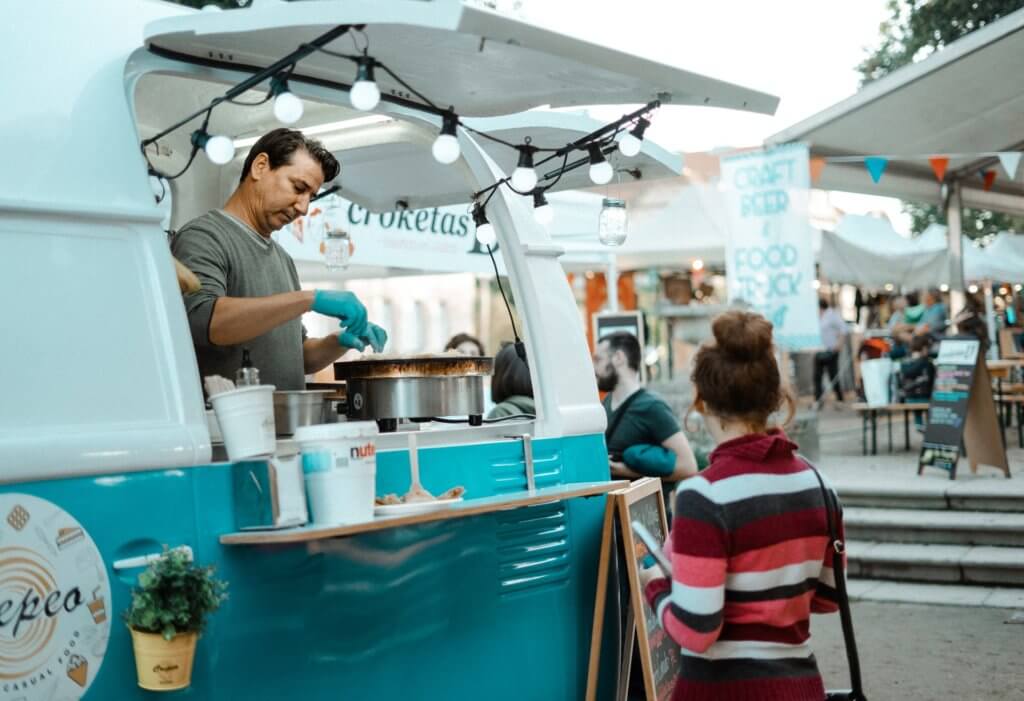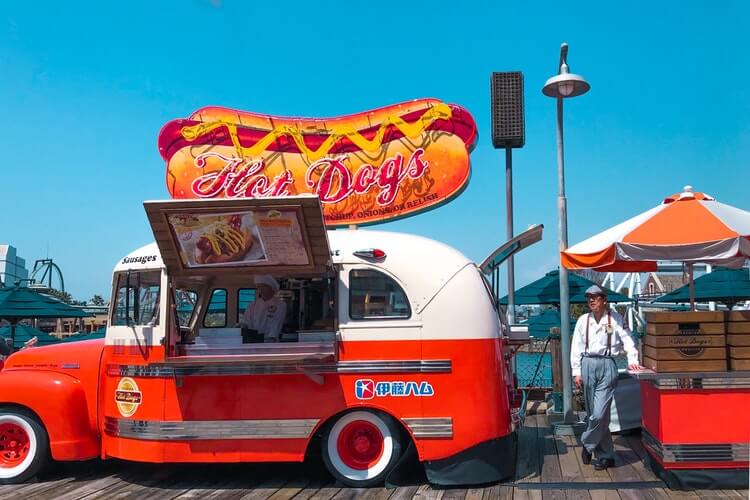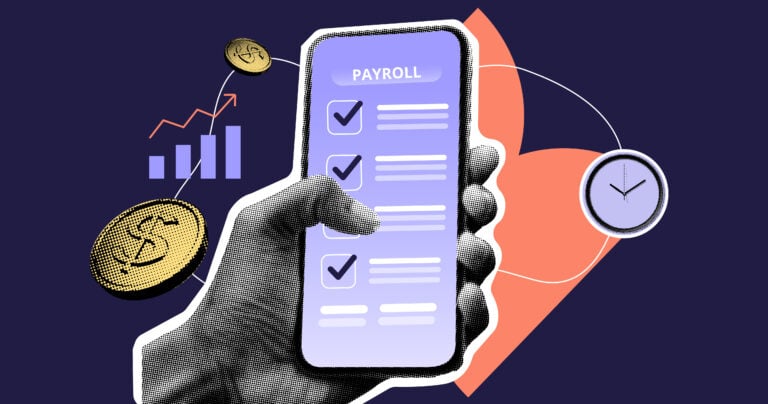Being a food truck business owner is an appealing way to realize your dreams, while also making money — there is no doubt about that.
But just like starting any other small business — it also means a lot of hard work, sleepless nights, and tons of people management.
Apart from standing out from the crowd, rocking the crowd with a great playlist, and selling delicious food, you also have to think about local zoning laws, health codes, and employee training. Then, add a handful of truck maintenance and a pinch of equipment breakdowns. Pour in some marketing activity, profit margins, and stir well. Voila — your food truck business is finally ready to serve.
Many people consider launching a food truck as a cheaper and easier alternative to owning a restaurant. Although it might be the case sometimes, since there is usually no rent payment involved in running a food truck business, other costs, difficulties and expenses can easily add up, so that you end up with the same or bigger cost and challenges as a regular stationary restaurant. So start with crunching numbers and creating a business plan.
Some Key Food Truck Business Costs
- The cost of a food truck can range anywhere from $40,000 for a used food truck, up to $200,000 for a brand new truck with a new kitchen.
- Buying a new kitchen and having it installed on a previously owned truck may cost you between $75,000 to $100,000 on average
- A water heater failure costs up to $3,000, a deep fryer failure costs up to $5,000, a refrigeration and freezer unit failure costs up to $6,000, and engine, transmission, and drivetrain failure can rack up expenses to the tune of $12,000
- It usually costs around $2,000 to $3,000 per month to rent a food truck, but the price depends on the type of truck and length of the lease
- Prices range from $3,600 to $3,800 a month for a new fully-built truck lease
- Food truck insurance cost starts around $2,000 annually but increases significantly for broader coverage
- According to a survey, over 85% of full-time food trucks generate over $100,000 in annual gross revenue. Over half of the vendors that responded sold $150,000 or more from their mobile food units last year
- Reports show that the street vendors industry in the US grew 3.4% from 2015 to 2020 and is expected to continue the growth
As you see, the costs for this type of business differ considerably, depending on the type of vehicle and your operational model. Some food truck business owners choose to buy a regular used van for as low as $5,000 and then build a food truck out of it. Others are looking into purchasing a turnkey food truck business, by leasing a finished, registered food truck with all the equipment built-in and an active license, or even buying a franchise from an active brand.
But the vehicle (or a trailer) purchase is just the beginning. Considering its condition, the type of food you’re going to cook/sell — hence all the required equipment, the final cost may differ a lot. It will also vary a lot in different states and locations, based on local prices, regulations, and permits.
Please see more food truck business cost examples here and here.

If after the initial cost estimations, you’re not scared away and still determined to go all in — great, you’re already ahead of the pack. But don’t rush in head first, at least until you go through Connecteam’s 11 tips on running a successful food truck business.
See how the Connecteam all-in-one small business app can help you to run your successful food truck business from your mobile phone. Oh, did we mention it’s completely free too?
Top Food Truck Business App
Streamline your operation and set yourself up for success!
11 Tips on Running A Successful Food Truck Business
Do Your Homework
When you have your idea and vision — don’t rush straight into owning and operating a food truck. Start with research. Running a successful food truck business, or any successful business for that matter, may look like a piece of cake from a distance or on the blue screen. But there are always some hidden rocks and nuances to consider.
Start with A to Z research:
If your local area already has successful food truck businesses — start with learning everything you can about them.
- How is their business going? Does it seem profitable? Why are some doing better than others?
- What kind of trucks do they use? How much do they cost to buy or rent? Is it better to buy them as-is and ready to go, or to design and build a custom food truck?
- What do they look like? How do they brand and promote themselves?
- Where do they usually park or drive? (and why) Do they need to pay some rent or commission for a parking spot and utilities?
- What kind of food do they offer? How much does it cost? How do they cook it? Is it good? Is it popular?
Only when you have answers to all those questions, should you go on the next stage of planning your successful food truck business plan. In order to get all those answers — try to interview other food truck business owners in your area, or even consider working for some of them, to see the process from within.
Oh, by the way, if there aren’t any other food trucks in your area — don’t be too fast to claim victory. Collective experience tells us that your competitors are most likely not stupid, and didn’t just “miss” this spot — there should be a reason for that. And the reasons may vary a lot: sometimes there’s just not enough “foot traffic” in your area. But in some places, the rules to get a mobile food permit are too strict, or it is plain illegal to sell food on the streets. So a total lack of competition might be a red flag! Pay even more attention to research and preparation.
Test It Out Before The Full Commitment
Instead of rushing into a large investment of your time and money, try catering to a few small parties outside of your friends or family. Getting honest feedback from paying customers will tell you right away whether you should quit your day job and turn your side project into your career.
Let’s face it, even if your friends and family keep telling you that you’re a great cook and should open a food truck or a restaurant — it might just not be the case. They love you and will be happy to get a free meal even if it’s not perfect, but are paying customers going to react the same way?
Before going all in and buying a food truck, all the more building your custom one — consider renting a food truck to feel it out, test yourself, and get real-life insights. Test the market with your food, see what’s popular, get customers’ feedback — then you could design your own truck to fit all your needs.
Another option if you’re on a budget — starting with a food cart instead of a full-size truck may be a smart way to go. You should be able to find a cart for about $2,000, which is much more affordable than the $100,000 that it takes to buy a new food truck.
“We actually started with ice cream carts. They were much less expensive initially and allowed us to test our concept before making the larger investment into a truck.” — Andrew from Em’s Ice Cream

Save Up or Secure Financing
Just because a food truck is much smaller than a restaurant, it doesn’t mean starting one is going to be cheap. It’s quite the opposite. On top of regular food and labor costs, you have a lot more to cover: to purchase a truck or trailer, insure it (both the vehicle and the business), get the permits — all in all, the complete food truck project costs can range from $40K to $250K. So you should look at this as a fully operational small restaurant, just a mobile one — then a lemonade stand.
Just like with starting any other small business, to launch a food truck business, you will most likely need some financing, unless you’re sitting on a pile of cash. Seeking funding for your food truck project is no different than funding any other small business launch, so you have plenty of options. This can range from a small business loan to peer-to-peer lending, to raising a friends-and-family round or getting a government small-business loan.
Regardless of your personal finances, credit, and what you’re willing to risk, there is usually at least one option for funding your endeavor. So make sure to do your research on small business funding and determine what is the best fit for you and your business.
Important note: In spring 2020, President Trump announced some special small business loans for conquering the COVID-19 crisis, so make sure to check Coronavirus special business loans and recovery aids.
Get Permits and Comply with Regulations
This is a key part of starting your small business which literally defines your success or failure. Based on location, obtaining a license can range from not easy to barely impossible, so you should prepare really well for it.
Just like obtaining a truck driver’s license or another permit can vary from state to state, and from country to country — so can the process for getting permits and licenses for your food truck. Also, the requirements for food truck licenses and permits vary from state to state — that means the same food truck may be completely legal to work in some states, but not in other ones.
So make sure you do thorough research when it comes to organizing your licenses and permits.
While requirements will vary per state, here is a list of commonly required food truck licenses and permits you’ll need to consider before you get started:
- Business License
- Employer Identification Number
- Vehicle License
- Seller’s Permit
- Food Handler’s Permit
- Health Department Permit
- Fire Certificates
“While we purchased the food truck itself for just $15,000, we didn’t realize that we’d spent more than double that to have it modified to fit the local fire and health regulations, which vary quite significantly depending on the municipality,” says Rachel Angulo, owner of La Cocinita food truck.
From securing a business license to food and fire inspections, there’s a lot of paperwork and behind the scenes diligence that must be done before you can hit the streets or start working those events. Talk to the right people, do your research, obtain your licenses and permits, and then keep copies of everything on your truck. This will save you valuable time and money in the future.
“I wish I had known how anti-truck the NYC government is. If I had known that there was no way I could legally own a permit for my business, that it was illegal to staff my truck the way I staff a restaurant, and that it would suddenly become illegal to sell from a metered parking spot whether or not I pay the meter” says Ben from Luke’s Lobster (New York, NY)
Get a Decent Truck or Trailer
The truck is the heart of any successful food truck business, so choosing and preparing the right truck might make or break your whole concept.
Many food truck owners try to save by buying a cheap used truck, and then spend days and thousands of dollars trying to fix it, instead of making money on the streets.
The price for an older truck can be around $50,000, and at times you may find one on the Roaming Hunger Marketplace for as low as $35,000.
Although the initial cost to acquire an old truck is considerably lower, the risk of hidden costs of repairs to the engine and kitchen will be high for lower quality trucks in the $50,000 range.
That’s why many experienced food truckers advise splurging on a good, stable truck as much as you can in the beginning — in order to save time and money down the road.
“The thing I wish I knew before starting would be to know which trucks run longer, have the quickest available replacement parts, which is easiest to maintain, and the pros/cons of diesel vs gasoline. The cooking, cleaning, and serving are the fun part, even if I’m working 18 hour days. Sucks being stuck on the side of the road thinking about all the profits being lost on a Saturday night.”— Joel from St. John’s Fire (Houston, TX)

Why are food trucks so expensive? Health departments have the same rules for food trucks as they do for restaurants, so your vehicle will need expensive specialty equipment.
Before settling on a truck or cart, plan out exactly what you’ll need to run your business. If your plan is to prepare hot foods on-site, you’ll need a large truck with a grill or a stove, as well as lots of cooler and freezer storage to hold the ingredients.
If, on the other hand, you can prepare food in advance in your home or commercial kitchen, then you can just keep your wares warm in a cart or smaller truck, all the way down to the sidewalk hot dog carts.
This will be the largest expense in your new business, you need to get it right. After all, you don’t want to spend $40,000 on a truck when you can do just as well with a $2,000 cart.
Team Up With The Right People & Never Stop Training Them
There’s safety in numbers as they say, and even though running a food truck business might look like a solo project, no successful business can thrive without a great team around you.
You may start out alone, but at some point, there’s a decision you are going to face: either you scale your project up into a really successful business and grow into a team — or you’re limiting your true success potential by your own pair of hands and free hours, which means it stays no more than just a hobby or a side hustle.
Most food trucks need a team of 3 – 5 employees to operate successfully during a lunch rush. Make sure these key employees are loyal, engaged, and well trained because the whole business will depend on their productivity.
If you are brave enough to follow your real potential and decide you’re going to build and run a truly successful food truck business — at some point you’re going to need to hire the right people and manage your employees, and payroll.
- If you as a food truck business owner will pay enough attention to onboarding, training, and retaining your best employees — you will never have to worry about finding new ones.
- Make sure your employees are motivated, engaged, and sold on your product — and they will work better than any marketing in selling it to your customers. Treat your employees the way you want them to treat customers, or even better!
- Don’t be mistaken — you’re in the people’s business, before the food business, so the knowledge and soft skills of your staff are superior to the menu when it comes to customer satisfaction. Training your employees to sell more and serve better can improve your bottom line and build a loyal community around your brand. So by reinvesting some money back into employee training instead of just saving them — you are actually growing and developing your business towards success, not just surviving.
- View suppliers and contractors as your partners, not adversaries. Although they are not a direct part of your team, they are your initial work contacts, and your business relies on them. So make sure you treat them well and stay in touch.
“A few months into starting the truck, I realized that in order for us to grow, I needed to remove myself from the truck to have time for answering emails, booking stops, developing new menus, promotion, and marketing, etc.
After doing that, I had to pay about three people to replace me, and I noticed that the quality of the product and service dropped. For instance, sometimes menu items would be served that were under my standards or we would open our doors for service later than we had on our schedule. “ — Stephanie from Seabirds Truck (Costa Mesa, CA)
Best Employee Training & Management App for Small Business!

Location Is Everything
They say there are three key elements in every profitable real estate deal:
1) Location
2) Location
3) Location
This couldn’t be more accurate for a successful food truck business. Food truck businesses are thriving only with the high foot traffic, so choosing the right place to park your truck might be a deal-breaker.
The good news is — unlike brick and mortar restaurants, if you see that the area you’re currently in is not working out as planned— you can start up and drive away to a more successful place. Also, experienced food truckers say that food trucks do have loyal followers. So if a food truck has a dedicated following, it can go anywhere and operate, thus creating new trendy areas.
However, there is another thing you should bury in mind: every area is different in terms of where you can park your food truck and how long you can park there.
There could be commercial versus noncommercial zoning restrictions, parking time limits, or distance restrictions from other establishments. Your city and local motor vehicle department can help you. Make sure you know the rules in each location where you plan on operating to prevent tickets and fines.
Promote. Promote. Promote!
It’s your own small business and no one else will make it successful, but you.
But there’s more to that. Experienced businessmen from different industries agree on one thing: Not the best product wins. The BEST KNOWN one does.
So if you think your recipe and truck design is important — they definitely are, but letting the world know about them is an even greater goal and the key to a successful food truck business. Because hey, you can have the best food ever, but it won’t sell until other people know it. Your job is to establish a presence and sell your delicious meal to people before they even reached the truck.
So if you thought that a successful food truck business is something like fishing, when having tasty stuff and a reliable truck is enough — you got it all wrong. Just sitting there, waiting for crowds of hungry customers might not work, unless you’re parked in the middle of Times Square, next to the naked cowboy.
This promotion should start way before you’re ready to hit the streets and never stop, transforming on different stages of the project:
- When deciding which niche you should take — don’t just think alone. Create polls and ask questions in your local networks and online communities. Use that to get insights from your future customers and also to tease your upcoming project
- Don’t wait until your truck is up and running with a fully operational kitchen installed — in parallel create your web site and social profiles, and start promoting the launch, and building the following
- When preparing a launch — make sure every dog in your area knows about it. Consider announcing some prizes and activities to make people come and bring friends.
- Another option is launching as a part of some event, when possible. This way you are not only getting your guaranteed traffic — but you can also get pictures and free promo in advance.
- Make your truck bright and appealing, seen from a mile away, turn the music up when possible. The true selling point usually happens when people see your truck from a distance and decide if they want to come to check you up.
“The one thing I wish I had known before I began my business would be how critical a big social media push would have been to help launch the business. I would have put way more focus avenues like Twitter, Facebook, Instagram, and the likes – connecting, announcing, introducing, giving offers, specials and a better communication effort to the world of social media.” — Chef Heidi from The Flip Truck (Orange County, CA)
How Can You Grow Your Revenue?
Yes, that favorite dish of yours is your specialty, and being an independent food-truck owner is a dream and a reason why you are starting this whole thing in the first place. But more often than not more IS better, so why limit yourself and your business potential.
In order to build a truly successful food truck business — you might want to multiply your sources of income. First, it will save you from stress and losses when your plan A, (selling food out of the truck) is not working as it should at some point, whether it’s because of weather, location, food quality, or a global pandemic. And it’s a WHEN not IF. No business is winning all the time.
Second — by diversifying your business activity you are not only adding additional income streams. The best practice is to add interconnected, and mutually beneficial activities, so every one of them will also push others.
So how can successful food truck business owners develop their business?
The options are plentiful, if not endless:
- Catering to private or public events
- Participating in festivals, concerts, open-air events, e.t.c
- Adding yourself to catering gigs booking platforms
- Selling online and providing delivery
- Adding yourself to the food ordering websites and apps like Wolt, Deliveroo, Cibus, etc.
- Consulting new food truck business players or wannabes
- Selling franchise for your business
- Building/selling food trucks
- Building/selling food truck equipment and appliances
- Creating a brand of cutlery and kitchen appliances
- Selling branded special recipes
- Selling cooking or food-trucking courses & master-classes
- Selling your merchandise
- Partnering with other businesses
- Creating branded podcast/youtube channels and becoming a food truck (or just food!) blogger/expert
“The truth is, my food truck serves more as an advertising vehicle for other revenue-generating channels, such as catering, food delivery, and cooking classes. Though we do make money with the food truck at special events, the daily grind is just not that profitable,” says Leah from Babycakes Truck (Chicago, IL)
Manage A Food Truck Business Like A Real Business
“Most food trucks don’t fail because of their food”, says Pat Flynn, founder of FoodTruckr.
Your menu and kitchen are really important, there is no doubt about that. But as many food trucks don’t make it because they ignore or underestimate the business management part of the operation.
People tend to underestimate just how much time, effort, and money goes into a food truck — that’s why food trucks fail for the same reasons as restaurants:
1) Low profits – expenses outrun the income, not enough sales for payroll for employees and suppliers
2) Layout – Food truck cannot handle the volume, equipment is bad and breaks down, the process is not optimal. Sometimes, a change in your kitchen outline can double your profits.
3) Menu – Food is not what customers want, takes too long to prepare and is too expensive,
4) Service – employees are rude to customers, too long to deliver food to customers, bad customer experiences.
5) Marketing – not looking appealing enough, not promoting online or elsewhere, not building a social following, not having a website, in short — not marketing to new customers.
6) Limitations – trying to handle too large of events, not bringing enough food or having too much food causing expensive losses, Low average ticket, and low volume resulting in Low profits.
Food truck business owners often fall victim to caring just about the food, but the most mouth-watering fish taco or creamy avocado sandwich will never be able to save a poorly run food truck business.
So in order to have a thriving food truck business and to be truly successful, you have to treat it like a full-time job. Running a successful food truck requires your complete focus and attention. To ensure that your truck has the best chances to thrive, be prepared to become a master at scheduling, creating expense reports, making business plans, and arranging a solid menu.
Use an Effective Small Business Management App
“Running a successful food truck means the ability to crank out 100 orders an hour, cover for the employee who no-call/no-showed, and maintain your social media presence all at once,” says Greg Golden of Phoenix’s most-liked truck, Mustache Pretzels
Being a food truck owner is not an easy task: there are just not enough hours in a day to pay attention to everything. Shopping for ingredients, managing your employees, fulfilling orders for suppliers, truck and kitchen maintenance checks, permits renewals… There is just no way to keep up with everything without an efficient tool to control and oversee all that from one place.
Connecteam is a leading small business management app that helps hundreds of small business owners save time and money on daily operations, streamline communication with teammates, suppliers, and partners, all while keeping their hand on the pulse, and overseeing the whole business performance, from an all-in-one business-management app.
A few years ago, a business management mobile app was something only huge companies like Starbucks and McDonald’s could afford. Today Connecteam gives you the possibility of having your own business management app set in 15 minutes for free, or only 29$/month if you wanna go pro.
- Digital checklists and forms reduce friction from daily activities, make recurring processes like opening a shift quick and seamless, and build a better oversight for you as a manager/ business owner to stay on top of things. You can create daily cleaning checklists (including images, descriptions, yes and no questions); equipment malfunction report, truck/kitchen inspection, maintenance work orders, ingredients order tickets, incident reports, and more.
- GPS time tracking will show you the exact location of your truck/trucks in real-time with GPS time tracking and will never let them try to fool you again with “buddy-punching” and time theft
- Employee timesheets can now be collected and exported for payroll in a click.
- You can save time by easily booking jobs and assigning team members, be notified when team members acknowledge or reject a shift, check-in late, or when they complete their tasks
- Realtime push notifications and updates for both formal and informal announcements, and work chats, both group and individual will let you streamline your team communication and make sure everyone stays in the know with relevant information. Important announcements, top employee recognition, equipment updates, or any other important messages will not be missed.
As a manager and business owner, you can choose one product for each challenge that you face.
Or, instead, you can choose an all-in-one small business management app that has all the features you really need.
Bottom Line on Running A Food Truck Business
Running a successful food truck business is a very appealing and trendy way to go, but it’s not easier than running any other business. In order to succeed, you need to be efficient and agile in managing your people and finances, because good food and a beautiful truck are simply not enough.
11 Tips on Running A Successful Food Truck Business:
- Do your homework
- Test it out
- Secure financing
- Sort out permits and licenses
- Get a decent truck
- Team up
- Choose location wisely
- Always promote
- Diversify & grow your revenue
- Run it like a proper business
- Use modern management software
Best Solution for Running A Successful Food Truck Business
Connecteam’s all-in-one app gives you all the tools you need to operate your pressure washing business including scheduling, time tracking, and communication features. After your free trial, you can choose our free-for-life plan, with no commitment!


